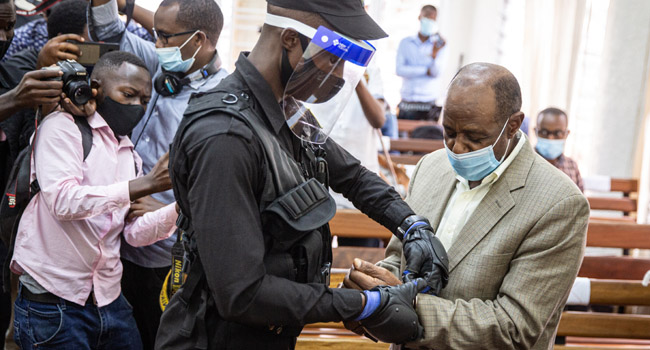Hotel Rwanda ‘Hero’ Refuses Trial, Star US Witness Takes Stand

![]()
Paul Rusesabagina, the polarising hero of the hit movie “Hotel Rwanda,” refused Wednesday to participate in his trial, as an American citizen testified that he had financed rebel activities against his government.
Rusesabagina, whose actions during Rwanda’s 1994 genocide inspired the movie, has been charged with nine offences, including terrorism for starting an armed group in recent years that is accused of staging deadly attacks within Rwanda.
The 66-year-old, who had been living in exile in Belgium, was arrested in January, after being tricked into getting onto a plane to Kigali when he thought he was going to Burundi.
Rwandan Justice Minister Johnston Busingye admitted in an interview with Al-Jazeera last month that the government had paid for the flight.
At Wednesday’s hearing, a letter from Nyarugenge Prison where Rusesabagina is being held was read out, saying that he would “never again appear before this court, not just today but even for future hearings.”
“He said that he does not expect any justice from this court,” according to the letter, written by prison director Michel Kamugisha.
Presiding judge Antoine Muhima ruled the trial would continue.
The prosecution’s star witness, US citizen Michelle Martin, a social work professor who worked with Rusesabagina’s foundation a decade ago, gave testimony for three hours.
She said she had been privy to email correspondence “about financing rebel activities” and accused Rusesabagina of “genocide denial”.
Martin revealed that once she discovered Rusesabagina was “engaging in activities that appeared to be illegal, I turned everything over to US law enforcement.”
She revealed she had acted as an informant in a 2012 investigation against him in the US. She also said she had previously held a contract with the Rwandan government which required her to register in the US as a foreign agent, admitting this could “impact my credibility”.
Her contracts, available on the US Department of Justice website, showed she was being paid by the government to research Rwanda’s post-genocide “conflict-generated diaspora”.
– ‘A paid spy’ –
Rusesabagina’s daughter Carine Kanimba told AFP that Martin’s testimony would never have stood in a fair trial due to her “conflict of interest”.
Meanwhile Kitty Kurth, spokeswoman for the Hotel Rwanda Foundation, said that Martin had in the past pushed Rusesabagina to join the Democratic Forces for the Liberation of Rwanda (FDLR) — a group run by Rwandan Hutu rebels.
“She was making the request as a paid spy of the government of Rwanda,” she said.
Rusesabagina’s family insist his rights have been trampled and he is not being afforded a fair trial, as he has been denied access to attorneys of his choosing, and has not been given access to over 5,000 pages of documents in his case file.
He is being tried alongside 20 others, who have all pled guilty and incriminated him.
– A complex image –
Rusesabagina is credited with sheltering hundreds of Rwandans inside a hotel he managed during the 1994 genocide, in which 800,000 mostly Tutsis but also moderate Hutus were slaughtered.
But in the years after Hollywood made him an international celebrity, a more complex image emerged of the staunch government critic, whose tirades against President Paul Kagame’s regime made him an enemy of the state.
Kagame has been in power since 1994 and is accused by critics of crushing opponents and ruling through fear.
As Rusesabagina grew more critical, railing against Kagame’s anti-Hutu sentiment — an extremely sensitive topic in Rwanda — so his image at home worsened as the regime attacked his character.
Detractors claimed he embellished his heroics, while some survivors groups accused him of profiting from their misery.
Rusesabagina has admitted to helping form the National Liberation Front (FLN), but denied any roles in its crimes.
Rwandan authorities blamed the FLN for a series of deadly attacks in 2018.
In a 2018 video supporting the FLN, Rusesabagina said: “The time has come for us to use any means possible to bring about change in Rwanda, as all political means have been tried and failed.”


